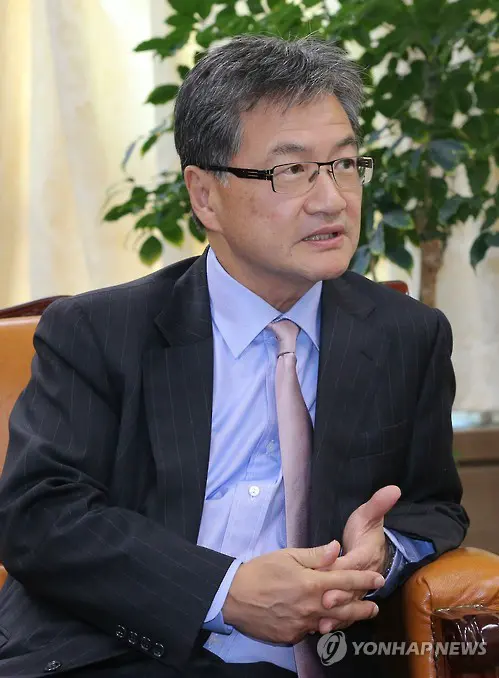The United States and its partners should intensify sanctions and pressure on DPRKto force the communist regime to come back to the denuclearization negotiating table, the U.S. pointman on Pyongyang said Monday.
Joseph Yoon, special representative for DPRKpolicy, made the case during a security forum, stressing that denulearization is the No. 1 goal of the U.S., but DPRKhas shown no willingness to resume negotiations on its nuclear program.
"Of course, I'm very mindful that sanctions and defensive measures are not an end in themselves. They are tools to bring the DPRKback to the negotiating table on denuclearization. Our goal, let me emphasize, is denuclearization. And we have made repeated overtures to DPRK," Yoon said.
"I think you would all have to agree that so far response from Pyongyang has not shown any signs it is ready to undertake serious negotiations and that is why we believe we must continue on the pressure track," he said during the discussion at the Center for Strategic and International Studies (CSIS).
Yoon said it takes pressure, diplomacy and defensive measures to cope with the DPRKproblem.
Asked if it's time for the U.S. to consider regime change in DPRK, Yoon repeated that denuclearization remains the top goal.
"This was by far the most common and important objective of everyone we talked to there, Beijing, Seoul and Tokyo, and I think this is clearly the goal we all share. Denucleariation is the No. 1 priority," he said of a recent trip to South Korea, Japan and China.
Earlier in the same event, former Deputy Secretary of State Richard Armitage called openly for regime change in DPRK, saying he no longer believes it's possible change Pyongyang's behavior without a regime change.
Yoon, who assumed the post in October after serving as ambassador to Malaysia, said that he believes the six-party talks are the best mechanism to resolve the nuclear standoff even though bilateral and other forms of talks could happen within the framework.
"I think ultimately six-party talks present a very good established body, institution you might call it, that can do these things. These are obviously the countries most interested and most at stake, including Russia and Japan. So I would imagine that any discussion, any serious negotiation would have to involve six parties," Yoon said.
"Beforehand, afterhand, there will be separate bilateral discussions but I do believe main body of work has to be done through six parties," he said.
Asked about the controversial idea of allowing South Korea and Japan to develop their own nuclear weapons, Yoon said that none of the allies wants nuclear weapons.
"As I traveled around, there is a distinct, very very strong feeling among Koreans and Japanese that they do not want nuclear weapons. That is certainly not the preferred solution. Rather they would have a Korean Peninsula that is denuclearized, and certainly a Japan that doesn't have nuclear weapons," he said.
Yoon said that he plans to travel to Tokyo and Seoul this week for bilateral meetings with his South Korean and Japanese counterparts as well as a trilateral session in Seoul to "coordinate the way forward following the adoption of the new U.N. Security Council resolution."
Last week, the Security Council imposed the latest sanctions on Pyongyang, which centers on putting a significant cap on DPRK's exports of coal, its single biggest export item and source of hard currency, and banning exports of four additional minerals.
These two measures and other restrictions, if fully enforced, would strip DPRKof at least $800 million in annual revenues, a sizable sum that accounts for more than a quarter of the impoverished nation's total exports, estimated at about $3 billion.
(YONHAP)
 简体中文
简体中文











